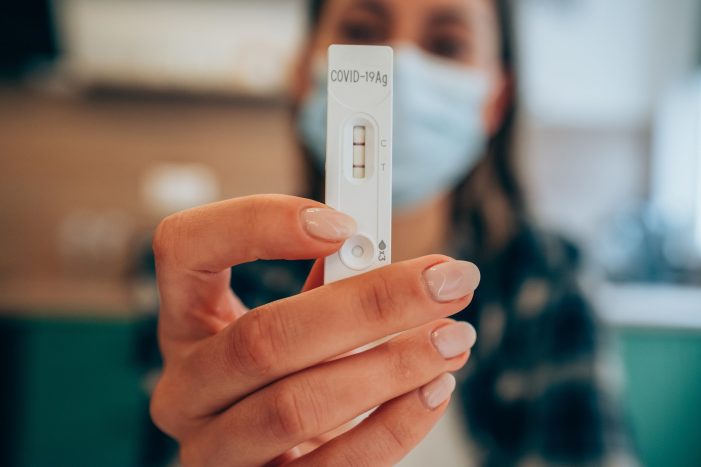
Since the beginning of the COVID-19 pandemic, public health officials have urged widespread testing for the presence of the SARS-CoV-2 virus that is associated with COVID-19 disease. The two types of coronavirus tests used for diagnosis are laboratory tests and rapid tests, which can either be an antigen test or a Nucleic Acid Amplification Test (NAAT). Viral tests use samples taken from the nose or mouth. Laboratories can perform Reverse Transcription Polymerase Chain Reaction (RT-PCR) tests, which can take days to evaluate. Rapid tests, which include self-tests, can be completed within a few minutes.1
Manufacturers of Coronavirus Tests Secured More Than $6 Billion in Profits in 2021
Abbott Laboratories, a leading maker of coronavirus tests, currently produces 70 million tests per month. Abbott has reported it has generated profits of more than $5 billion in global sales in the first three quarters of 2021 after the launch of its over-the-counter test BinaxNOW sold at Walmart, Walgreens and CVS stores.2 3 Thermo Fisher Scientific, another leading maker of coronavirus tests, earned over $6.8 billion in sales revenue during the same time period.4 Quidel Corporation, which produces the QuickVue test sold at major pharmacy chains in the U.S., reported revenue of $406 million from its tests in the third quarter of 2021.5
Laboratories and Drug Stores Also Profiting from Widespread SARS-CoV-2 Testing
Laboratories that process RT-PCR tests, the main tool for detecting SARS-CoV-2, are also financially benefitting from tests. LabCorp and Quest Diagnostics have generated billions of dollars in profits after processing thousands of coronavirus tests.6
LabCorp has performed more than 50 million coronavirus tests to date and reported a revenue of almost $2.8 billion in 2020 from the tests. Quest Diagnostics, which charges $125 for a coronavirus test, said it expected to generate more funds in 2021 because of higher rates of testing.7 According to Consumer Reports, when asked whether it was ethical for private companies to make profits from coronavirus tests, LabCorp and Quest Diagnostics declined to directly answer the question.8
Joshua Sharfstein, MD, vice dean for public health practice and community engagement at the Johns Hopkins Bloomberg School of Public Health said:
Our healthcare system is well-acquainted with the concept of making a profit from diagnostic testing, so it’s no surprise that some have found a way to do so.9
Pharmacy chains have also seen increases in revenue from coronavirus tests. Walgreens Boots Alliance reported more than $3.5 billion in quarterly profits as a result of an influx of customers getting COVID vaccines or getting tested for SARS-CoV-2 as the Omicron variant spreads throughout the U.S.10 CVS Health Corp said that increase demand for over-the-counter coronavirus testing in December 2021 helped increase their revenue in their retail segment.11
Fraudulent Testing Sites Putting Consumers At Risk
Due to the high demand of coronavirus testing, there have been many pop-up testing sites across the country. Private companies, which provide legitimate testing, operate some of these testing sites. However, there are other testing sites that are reported to be illegitimate and are committing fraud. Some of these fraudulent testing centers are putting consumers at risk for identity theft, inaccurate or missing test results and financial loss.12
Employees at a sidewalk coronavirus testing tent in Philadelphia, for example, falsely claimed to be working in collaboration with the Federal Emergency Management Agency (FEMA) and, subsequently, FEMA informed the Philadelphia Department of Public Health that it was not funding any testing sites in the city at that particular time. James Garrow, communications director for the Philadelphia Department of Public Health said:
Currently, there are no quick markers to help folks know if a site is legitimate or not. That’s why we’re investigating if it is possible to provide a placard to demonstrate that a site is legitimate.13
Current law in the U.S. allows for-profit, pop-up sites offering coronavirus rapid tests to operate without any experience in health care. Ge Bai, PhD, a professor of accounting at Johns Hopkins University Carey Business School who has studied the price of coronavirus tests said:
These companies are taking advantage of the limited supply of COVID tests to make money. The limited supply, caused by suboptimal public health policymaking, creates this very attractive market opportunity for businesses to exploit.14
If you would like to receive an e-mail notice of the most recent articles published in The Vaccine Reaction each week, click here.
Click here to view References:
No comments:
Post a Comment